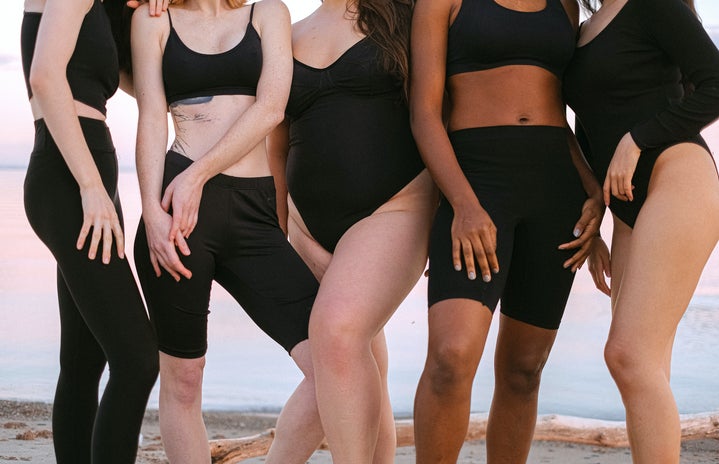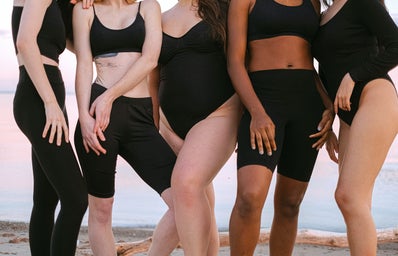The modern-day body positivity movement started out with good intentions, but has amounted to very little – and it’s easy to see why. The transformation of the body positivity movement into reductive, catchy messages and taglines mostly aimed toward women – “everyone is beautiful,” “all women are beautiful,” “celebrating all types of beauty” – is inherently flawed.
The issue with “body positivity” is that there’s no reason human beings need to be seen as beautiful, and using beauty as the metric by which we measure worth has undoubtedly negative effects on women. By saying all women are beautiful, all bodies are beautiful, you conflate worth and value with beauty when the truth is that we are all valuable, whether or not we are held to an arbitrary and ever-shifting standard of beauty.
Women are constantly held to a gaze, whether it’s a societal gaze or a male gaze. Society is constantly holding them to rigid binaries – sexual objects or worthless. It’s the modern-day Madonna or whore complex (but let’s remember both Madonna and the whore are valued for their “beauty.”) The solution to constant objectification is not to expand the category of sexual object, to console women by telling them it’s alright, the gaze finds you sexually appealing too! (Even if it has to make a sincere effort to do so.)
A huge proponent of the movement is Dove, which is still dedicated to creating a “vision where beauty is a source of confidence, not anxiety.” Dove ran an entire campaign with the tagline “Real Beauty,” and released a series of heartwarming videos about 5-10 years ago; I even remember watching some of these during health class in middle school.
In one of their most famous videos, “You’re more beautiful than you think,” an artist sketched people based on their descriptions of themselves and based on descriptions from acquaintances. The point was that strangers will often see you as more beautiful than you think you are…and of course they will! Most normal people don’t go around degrading strangers’ looks, and we’re undoubtedly harder on ourselves than anyone else, continuously forced to live with our bodies and appearances under the crushing force of societal pressure.
The major impact the #RealBeauty campaign had was highlighting a critical problem with the body positivity movement – how easily it was commodified by a corporation. Like Lizzo herself said, “Anybody that uses body positivity to sell something is using it for their personal gain. That’s just it.” I prefer the version she often yelled out to her audiences, which while it still said “you are beautiful,” at least added “you can do anything!”
That’s not to rag on everything Dove is doing, as some of their initiatives, like The CROWN Act, which is focused on “eradicating race-based hair discrimination,” seem to be in good faith. However, the brand’s entire message is seemingly centered around finding a sense of self in your “beauty” – the site even greets you by saying “hey beautiful.”
The same debilitating social effect is seen with the recent emphasis on “natural” makeup looks. The more naturally you do your make up, the more it becomes an enhancement or improvement of your face instead of an artistic expression. The more regularly you do “natural, everyday” makeup looks, the more alien your real face will become, and the more harshly you’ll criticize it for not actually resembling an often Eurocentric standard of beauty.

Because the body positivity movement values beauty, it inevitably benefits those who are already conventionally attractive. I’m so tired of seeing Instagram influencers or Tik Tokkers co-opting the body positivity movement to cover the fact that they want to show off their bodies – there’s nothing wrong with wanting to do that, but they don’t need to hide underneath some moral messaging.
How often has the body positive movement actually benefited plus-size, disabled, queer, or trans women who don’t fit conventional body standards? “Fat” women are constantly swinging between being publicly berated (just look at all the backlash Lizzo faces) or commended for their immense “bravery” in embracing their bodies. Women in the margins are so often excluded from the body positivity movement. Many times, they have to adhere to strict gender performance to be seen as “beautiful.”
Slogans and movements don’t make it any easier to accept yourself, to move beyond the negative thoughts you have about your own appearance. The body positivity movement tells you that you are beautiful, and if you find it difficult to accept that for yourself, suddenly the fault is shifted to you – to your self-confidence or self-criticism, and not to the rigid social standards of beauty. If harsh self-criticism or low self-esteem does genuinely plague you though, taking special care of your mental health and perhaps pursuing professional health are more viable responses.
What we need to move toward is body neutrality – the concept of rejecting the value system of beauty as a standard of worth and instead seeing the body with a neutral gaze. Your body is part of you. It is you. Let’s start looking at all that our bodies do for us and all that we can do for them, instead of constantly thinking about whether or not they are beautiful. Look at how amazing your body is, how it carries you from day to day, from accomplishment to accomplishment, and take solace in your inherent value as a person. That’s the kind of positive energy we need about our bodies.
I’ve never been able to accept that I’m beautiful for a myriad of reasons – my own life, the subjective definition of the word, the fact that I don’t fit conventional standards of beauty. And never has the body positivity movement convinced me I was beautiful; not when the gaze of the whole world contradicts that notion. But what does help is the freedom of knowing that it doesn’t matter. You’ll never be beautiful to everyone; maybe you’ll always have trouble thinking it about yourself. But you are still valuable. You are still human. And your body is still worthy of respect, whether someone thinks it’s attractive or not.


